Module 11 Body language unit 3 language in use 公开课教学课件 (共33张PPT)
文档属性
| 名称 | Module 11 Body language unit 3 language in use 公开课教学课件 (共33张PPT) |  | |
| 格式 | zip | ||
| 文件大小 | 3.4MB | ||
| 资源类型 | 教案 | ||
| 版本资源 | 外研版 | ||
| 科目 | 英语 | ||
| 更新时间 | 2017-11-19 22:28:39 | ||
图片预览

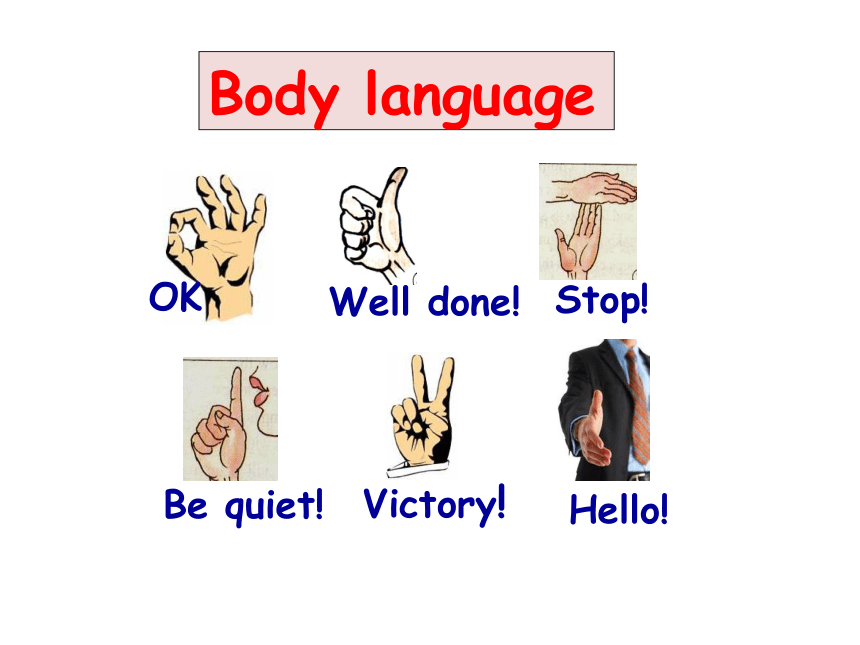


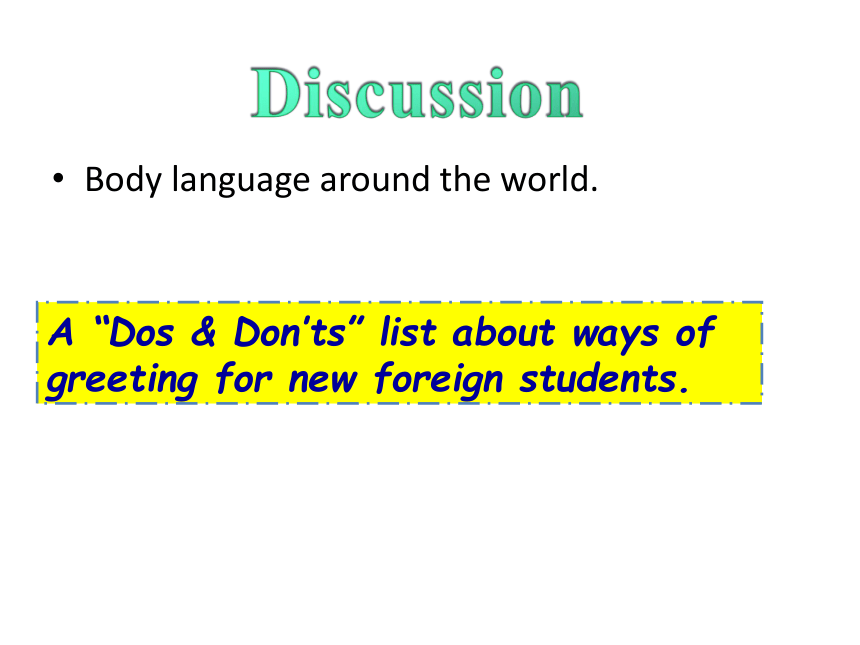



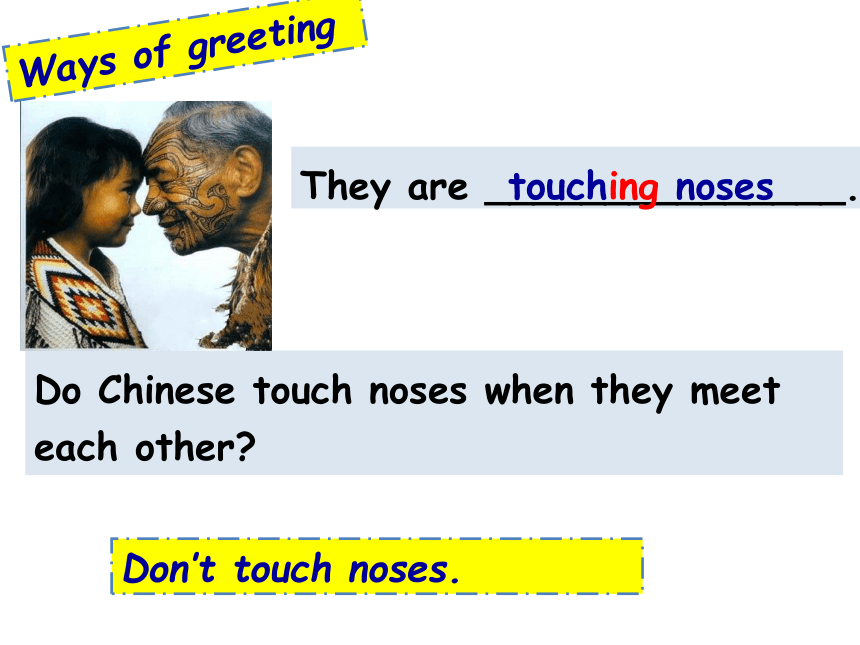
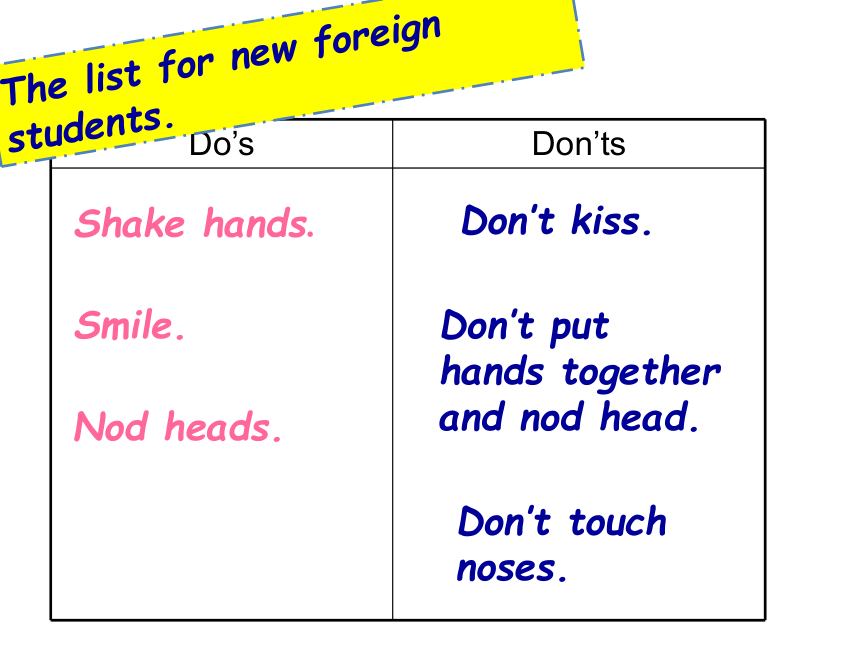
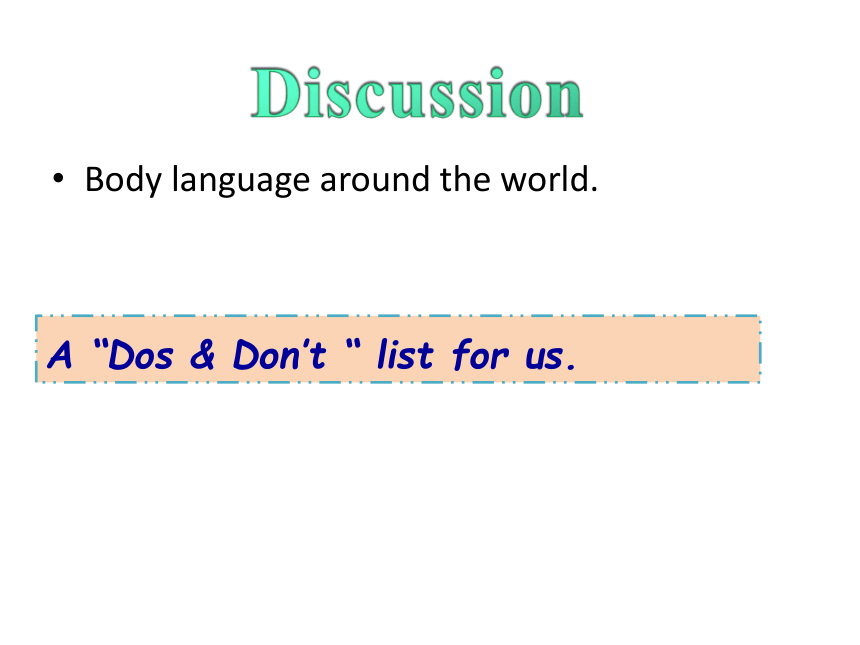
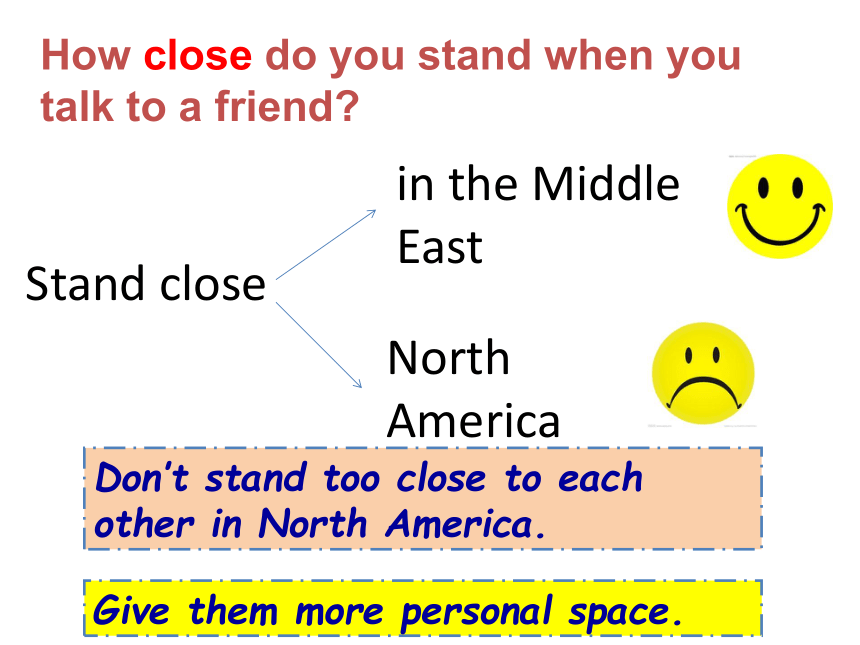
文档简介
课件33张PPT。Module 11Unit 3Hello! Body languagePeople from different countries have _______body language.differentOur new foreign students are going to arrive very soon.Body language around the world.DiscussionA “Dos & Don’ts” list about ways of greeting for new foreign students.What do Chinese do when they meet each other?
They usually ______________________, and sometimes they _________________.shake hands and smilenod their headsWays of greetingThey are _______________.kissing and smilingDon’t kiss when you meet Chinese.Do Chinese kiss when they meet each other?Ways of greetingShe is _______________.putting hands togetherDon’t put hands together and nod head.Do Chinese put their hands together and nod their heads when they meet each other?Ways of greetingThey are _______________.touching nosesDon’t touch noses.Do Chinese touch noses when they meet each other?Shake hands.Smile.Nod heads.Don’t kiss.Don’t put hands together and nod head.Don’t touch noses.The list for new foreign students.Body language around the world.DiscussionA “Dos & Don’t “ list for us.How close do you stand when you
talk to a friend?Stand closein the Middle East North AmericaDon’t stand too close to each other in North America.Give them more personal space.Do you touch people when
you talk to them?They are _______________.walking arm in armDo the British like touching people?Don’t touch them.They are _______________.talking and looking
at each other Do the British look at each other when they talk?Look at people when you talk to them.Do you look at people when you talk
to them?How do you say goodbye? _______________.Wave to say goodbyeIs it polite to wave to say goodbye in Greece?No, it isn’t. It’s _____ to wave to say goodbye in Greece.Don’t wave to say goodbye in Greece.rude√Give them more personal space.√Look at each other when you talk.Don’t stand too close to them.Don’t touch them.Don’t wave to say goodbye.The list for us.Suggestions √Shake hands, smile, and nod heads when you greet Chinese.√Give them more personal space.√Look at each other when you talk to British.Don’t stand too close to North American.Don’t touch British.Don’t wave to say goodbye in Greece.Imperative sentences
(祈使句)用于表达命令、请求、劝告、警告、禁止等的句子。Structure of imperative sentences 1.Give them more personal space.2. Look at each other when you talk.2.Don’t stand too close to them.1.Don’t wave to say goodbye.主语?
_____开头主语?
______开头3. Be careful.动词原形Don’t1.句子的主语通常是第二人称,习惯上省略。
2. 结构
(1) 肯定祈使句 :(谓语)动词原形+其它成分
(2) 否定祈使句:
多以do not(通常缩写为don’t)开头。
口 诀
下面的口诀总结了祈使句的一般规律。一起来看看吧!
祈使句,有特点,
动词原形摆在前,
否定句式也不难,
Don’t 放在最前面,
其它一律都不变。 Task 1 Choose the correct answer.
1. __________, or you’ll be late.
A. Hurry up B. Take it down
C. To hurry up D. Hurries up
2. ________ talk loudly. The baby is sleeping right now.
A. Do B. Does
C. Don’t D. Doesn’t
A CExercise3. Don’t _______ too much TV. It’s bad for your eyes.
A. watch B. watched
C. watching D. to watch
4. ________ sleep too late. It’s bad for your health.
A. Do B. Not
C. Don’t D. Please not
C AExerciseTask 2 Fill in the blanks.
_________ (not, be) late for class.
2. _________ (not, talk) and _______ (read) aloud.
3. _____ (be)polite to the teacher.
4. _______ (look) out! A car is coming.
Don’t beDon’t talkreadExerciseBeLook1. It’s important to be careful.
2. It’s important to clean and tidy the lab.
3. You cannot touch anything if the teacher
doesn’t ask you to.
4. You cannot bring food or drink into the lab.
5. You cannot enter the lab alone.Be careful.Clean and tidy the lab.Don’t touch anything if teacher ask doesn't ask you to.Don’t bring food or drink into the lab.Don’t enter the lab alone. Task 3 Rewrite the sentences.What can we do at school?
What can’t we do at school?DiscussionA: Can we be late for class?
B: No, We can’t be late for class.Don’t be late for class.Our class rules.A: Shall we stand up when we answer a question in class?
B: Yes, we shall.Stand up when you answer
a question in class.Our class rules.Don’t ___ in class.A: Can we eat in class?B: No, We can’t eat in class.eatOur class rules.runfightplay sportslisten to musicfriendlypolite CLASS RULES
1. Don’t be late for class.
2. Don’t run in the classroom.
3. Don’t eat in class.
4. Don’t listen to music in class.
5. Don’t fight.
6. Be polite to the teacher.
7. Be friendly to classmates.
…summaryImperative sentences
(祈使句)Different body language in different countries.Our class rules.
talk to a friend?Stand closein the Middle East North AmericaDon’t stand too close to each other in North America.Give them more personal space.Do you touch people when
you talk to them?They are _______________.walking arm in armDo the British like touching people?Don’t touch them.They are _______________.talking and looking
at each other Do the British look at each other when they talk?Look at people when you talk to them.Do you look at people when you talk
to them?How do you say goodbye? _______________.Wave to say goodbyeIs it polite to wave to say goodbye in Greece?No, it isn’t. It’s _____ to wave to say goodbye in Greece.Don’t wave to say goodbye in Greece.rude√Give them more personal space.√Look at each other when you talk.Don’t stand too close to them.Don’t touch them.Don’t wave to say goodbye.The list for us.Suggestions √Shake hands, smile, and nod heads when you greet Chinese.√Give them more personal space.√Look at each other when you talk to British.Don’t stand too close to North American.Don’t touch British.Don’t wave to say goodbye in Greece.Imperative sentences
(祈使句)用于表达命令、请求、劝告、警告、禁止等的句子。Structure of imperative sentences 1.Give them more personal space.2. Look at each other when you talk.2.Don’t stand too close to them.1.Don’t wave to say goodbye.主语?
_____开头主语?
______开头3. Be careful.动词原形Don’t1.句子的主语通常是第二人称,习惯上省略。
2. 结构
(1) 肯定祈使句 :(谓语)动词原形+其它成分
(2) 否定祈使句:
多以do not(通常缩写为don’t)开头。
口 诀
下面的口诀总结了祈使句的一般规律。一起来看看吧!
祈使句,有特点,
动词原形摆在前,
否定句式也不难,
Don’t 放在最前面,
其它一律都不变。 Task 1 Choose the correct answer.
1. __________, or you’ll be late.
A. Hurry up B. Take it down
C. To hurry up D. Hurries up
2. ________ talk loudly. The baby is sleeping right now.
A. Do B. Does
C. Don’t D. Doesn’t
A CExercise3. Don’t _______ too much TV. It’s bad for your eyes.
A. watch B. watched
C. watching D. to watch
4. ________ sleep too late. It’s bad for your health.
A. Do B. Not
C. Don’t D. Please not
C AExerciseTask 2 Fill in the blanks.
_________ (not, be) late for class.
2. _________ (not, talk) and _______ (read) aloud.
3. _____ (be)polite to the teacher.
4. _______ (look) out! A car is coming.
Don’t beDon’t talkreadExerciseBeLook1. It’s important to be careful.
2. It’s important to clean and tidy the lab.
3. You cannot touch anything if the teacher
doesn’t ask you to.
4. You cannot bring food or drink into the lab.
5. You cannot enter the lab alone.Be careful.Clean and tidy the lab.Don’t touch anything if teacher ask doesn't ask you to.Don’t bring food or drink into the lab.Don’t enter the lab alone. Task 3 Rewrite the sentences.What can we do at school?
What can’t we do at school?DiscussionA: Can we be late for class?
B: No, We can’t be late for class.Don’t be late for class.Our class rules.A: Shall we stand up when we answer a question in class?
B: Yes, we shall.Stand up when you answer
a question in class.Our class rules.Don’t ___ in class.A: Can we eat in class?B: No, We can’t eat in class.eatOur class rules.runfightplay sportslisten to musicfriendlypolite CLASS RULES
1. Don’t be late for class.
2. Don’t run in the classroom.
3. Don’t eat in class.
4. Don’t listen to music in class.
5. Don’t fight.
6. Be polite to the teacher.
7. Be friendly to classmates.
…summaryImperative sentences
(祈使句)Different body language in different countries.Our class rules.
同课章节目录
- Module 1 Lost and found
- Unit 1 Whose bag is this?
- Unit 2 Are they yours?
- Unit 3 Language in use
- Module 2 What can you do ?
- Unit 1 I can play the piano
- Unit 2 I can run really fast
- Unit 3 Language in use
- Module 3 Making plans
- Unit 1 What are you going to do at the weekends?
- Unit 2 We're going to cheer the players.
- Unit 3 Language in use
- Module 4 Life in the future
- Unit 1 Everyone will study at home
- Unit 2 Every family will have a small plane.
- Unit 3 Language in use
- Module 5 Shopping
- Unit 1 What can I do for you?
- Unit 2 You can buy everything on the Internet
- Unit 3 Language in use
- Module 6 Around town
- Unit 1 Could you tell me how to get to the Nationa
- Unit 2 The London Eye is on your right.
- Unit 3 Language in use
- Revision module A
- Module 7 My past life
- Unit 1 I was born in a small village.
- Unit 2 I was born in Quincy.
- Unit 3 Language in use
- Module 8 Story time
- Unit 1 Once upon a time….
- Unit 2 Goldilocks hurried out of the house.
- Unit 3 Language in use
- Module 9 Life history
- Unit 1 He left school and began work at the age of
- Unit 2 He decided to be an actor.
- Unit 3 Language in use
- Module 10 A holiday journey
- Unit 1 What did you do?
- Unit 2 This morning we took a walk.
- Unit 3 Language in use
- Module 11 Body language
- Unit 1 They touch noses!
- Unit 2 Here are some ways to welcome them.
- Unit 3 Language in use
- Module 12 Western music
- Unit 1 It's so beautiful!
- Unit 2 Vienna is the centre of European classical
- Unit 3 Language in use
- Revision module B
